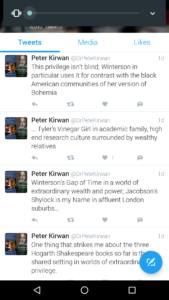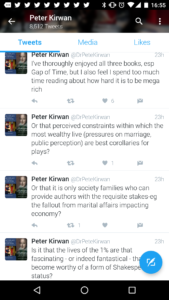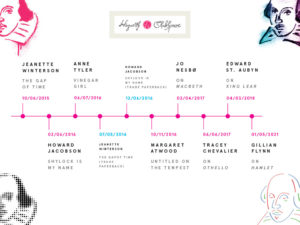The Hogarth Shakespeare
On 27 June 2013 Random House announced the Hogarth Shakespeare list. It was a few days before the Penguin Random House merger was announced. The Hogarth Shakespeare list was to be launched in 2016 to coincide with Shakespeare’s 400th birthday celebrations. The press release stated: “Hogarth, Random House’s transatlantic fiction imprint, today announces a major international project to delight Shakespeare fans worldwide: The Hogarth Shakespeare. The project sees the Bard’s plays retold by acclaimed, bestselling novelists and brought alive for a contemporary readership.” This international publishing initiative is led by Hogarth UK and published in partnership with Hogarth US, Knopf Canada, Knaus Verlag in Germany and Mondadori in Spain; and Random House Australia, New Zealand, South Africa and India. The novels will be published simultaneously across the English-speaking world in print, digital and audio formats.
On 9 September 2013 some of the writers publishing retellings of Shakespeare’s plays were announced. Canada’s most eminent novelist, poet and critic Margaret Atwood had selected The Tempest – the play
of magic and illusion thought to be one of Shakespeare’s last. Atwood comments:
‘The Tempest has always been a favourite of mine, and working on it will be an invigorating
challenge. Is Caliban the first talking monster? Not quite, but close…’
Award-winning novelist and critic Howard Jacobson, best known for his prizewinning tragi-comic
novels had chosen one of Shakespeare’s most controversial plays – The Merchant of Venice.
Jacobson comments:
For an English novelist Shakespeare is where it all begins. For an English novelist who also happens
to be Jewish The Merchant of Venice is where it all snarls up. “Who is the merchant and who is the
Jew?” Portia wanted to know. Four hundred years later, the question needs to be reframed: “Who is
the hero of this play and who is the villain?” And if Shylock is the villain, why did Shakespeare
choose to make him so?
‘Only a fool would think he has anything to add to Shakespeare. But Shakespeare probably never met
a Jew, the Holocaust had not yet happened, and anti-Semitism didn’t have a name. Can one tell the
same story today, when every reference carries a different charge? There’s the challenge. I quake
before it.’
These two additions to the series were alongside Anne Tyler’s take on The Taming of the Shrew and
Jeanette Winterson on The Winter’s Tale. A few months later Jo Nesbo was commissioned for a retelling of Macbeth.
The three novels published so far under the new imprint — Jeanette Winterson’s The Gap of Time, Howard Jacobson’s Shylock is my Name and Anne Tyler’s Vinegar Girl are immensely readable stories. The plot structures are very true to the original plays. The three writers who have published their stories so far have explored their pet themes — sexual identities, Jewish identities, commerce, immigrants and family life. Of the three stories Jeanette Winterson’s is so far the best. Her testimony at the end of the book reads:
I wrote this cover version because the play has been a private text for me more than thirty years. By that I mean part of the written wor(l)d I can’t live without; without, not in the sense of lack, but in the old sense of living outside of something.
It’s a play about a foundling. And I am. It’s a play about forgiveness and a world of possible futures — and how forgiveness and the future are tied together in both directions. Time is irreversible. ( p.284 -5)
The Gap of Time is the only novel of the three published to include a synopsis of the original Shakespearean play. According to the editors it is unnecessary since every reader has access to the Internet and can easily look up the reference. But easy and smooth internet access is not always a given for many readers. Having said that it is also not possible for all readers to verify the authenticity of the retellings available online. So it may have been prudent to include a few extra pages in every novel with the original story and include a precis on the official web page for the series: http://crownpublishing.com/hogarth-shakespeare/ .
All the novels are undoubtedly lovely to read. But as Dr Peter Kirwan, Assistant Prof of early modern drama, School of English,  University of Nottingham and theatre critic pointed out on Twitter ( 4 July 2016) “One thing that strikes me about the three Hogarth Shakespeare books so far is their shared setting in worlds of extraordinary privilege. And I worry that perhaps it’s too easy to transfer Shakespeare to the domain of the privileged, which seems an unhelpful message to send. I say again – not a fault of any individual book, but am interested by this indirect link. And I think that there are many resonances with Shakespeare today that integrate a broader range of class experiences. Tyler’s interest in the immigrant experience and
University of Nottingham and theatre critic pointed out on Twitter ( 4 July 2016) “One thing that strikes me about the three Hogarth Shakespeare books so far is their shared setting in worlds of extraordinary privilege. And I worry that perhaps it’s too easy to transfer Shakespeare to the domain of the privileged, which seems an unhelpful message to send. I say again – not a fault of any individual book, but am interested by this indirect link. And I think that there are many resonances with Shakespeare today that integrate a broader range of class experiences. Tyler’s interest in the immigrant experience and  Winterson’s in the poverty divide are, for me, where the series’ true potential lies. A potential, that is, to use Shakespeare to highlight contemporary instances of intersectionality and cultural meeting points rather than privileging the already-powerful dominant perspective.” ( Tweets copied from his timeline @DrPeteKirwan.)
Winterson’s in the poverty divide are, for me, where the series’ true potential lies. A potential, that is, to use Shakespeare to highlight contemporary instances of intersectionality and cultural meeting points rather than privileging the already-powerful dominant perspective.” ( Tweets copied from his timeline @DrPeteKirwan.)
All said and done this is a series worth collecting and reading. Later this year the novels by Margaret Atwood and Jo Nesbo are to be published. A rich year!
****
About Hogarth
In 1917 Virginia and Leonard Woolf started The Hogarth Press from their Richmond home, Hogarth House, armed only with a hand-press and a determination to publish the newest, most inspiring writing. It went on to publish some of the twentieth century’s most significant writers, joining forces with Chatto & Windus in 1946.
Inspired by their example, Hogarth was launched in 2012 as a home for a new generation of literary talent; an
adventurous fiction imprint with an accent on the pleasures of storytelling and a keen awareness of the world.
Hogarth is a partnership between Chatto & Windus in the UK and Crown in the US, and its novels are published
from London and New York.
Jeanette Winterson The Gap of Time
Howard Jacobson Shylock is my Name
Anne Tyler Vinegar Girl
Hogarth Shakespeare, Hogarth, an imprint of Vintage, Penguin Random House, London, 2015 / 16.
5 July 2016



No Comments